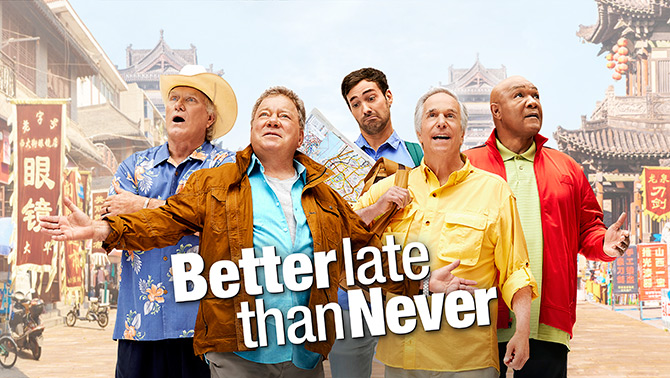
There’s a saying that everything old is new again, and that’s certainly true on TV these days. Benidorm Bastards paved the way for old people letting loose on TV, as elderly pranksters shouted at cash machines, smashed plates in busy department stores and discussed their lingerie at a bus stop in front of mortified teenagers. The format won two Rose d’Or awards in 2010 and has enjoyed success in various territories including the US, as Betty White’s Off Their Rockers.
Sky1 built on the trend in August 2014, with 50 Ways to Kill Your Mammy. Baz Ashmawy took his mother on a global, adrenaline-fuelled road-trip in which, among other experiences, she learned how to shoot a gun and mercilessly zapped her son with a Taser. The programme set the bar high; viewers responded immediately to the slapstick humour and sarcastic interactions between mother and son, but also the genuine love and affection beneath the banter.
TV is not only responding to a societal change, but shaping our response to it.
The trend is not confined to familial interactions. Indeed, elderly celebrities are also making their mark at the moment. BBC2’s The Real Marigold Hotel, in which famous faces sampled retirement in India, was well-received and is returning for a second series. More recently, Better Late Than Never has proved a hit for NBC in the US. The first series averaged 8.1m viewers and a second has already been commissioned. The format, which first aired in Korea as Grandpas Over Flowers, follows a group of older celebrities as they embark on comical escapades around Asia. For viewers, the appeal is twofold: the glamour of an exotic travelogue and the fun of beloved celebrities going off-script.
This duality is key to the way the elderly are now reclaiming primetime. Shows centred on older people tend to take one of two directions. Programmes such as those mentioned above offer a comedic perspective on later life, with seniors getting away with things usually associated with their younger counterparts. A Granny’s Guide to Modern Britain, for instance, finds one old lady wandering the streets trying out new-found swear words while a trio of old friends sample Amsterdam’s hash bars.
Other programmes in this genre have taken a more sentimental tone, however; celebrating the elderly and what we can learn from them. Sky1’s OAP’s Internet Virgins, which aired in summer 2015, sought to show how young and old can learn from each other and was charmingly emotional. This tone has continued to be picked up on over the last year, with BBC2’s Old School with Hairy Bikers pairing teenagers with pensioners for the duration of a school term.
Even in shows not explicitly about old age, this trend can still be felt. The announcement that 81-year-old Mary Berry will not be re-joining Bake Off when it moves to Channel 4 caused near mass hysteria in the UK. Mary seems as important to the format as flour and sugar; viewers simply cannot imagine the show without her and Berry’s cool granny persona is a huge part of that. She provides no-nonsense, sensible comments with a slice of matronly warmth and decades of experience. Viewers trust her judgement, but respond to her charm. It is hard to think of someone more qualified for the job; everyone in the UK is certainly struggling to do so.
This desire to see old people represented on TV does not show signs of waning. Next week, the new series of Asian Provocateur will find comedian Romesh Ranganathan taking his mum on an American road-trip. Meanwhile, NBC has built on the success of Better Late Than Never by commissioning Little Big Shots: Forever Young, which offers pensioners the chance to showcase their myriad talents.
As people live longer and an increasing number of young people now live with their parents long into adulthood, multi-generational households are becoming the norm – much as they are in Asia. Perhaps western viewers are also waking up to the lessons we can learn from our elders. Rather than disappearing into the background, they are becoming increasingly visible and even more popular. As always, TV is not only responding to a societal change, but shaping our response to it.
